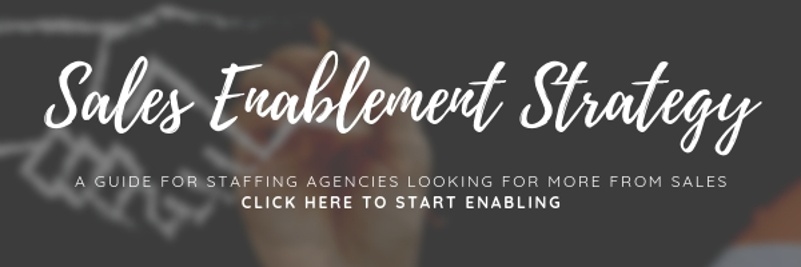It happened again, didn't it?
A star performer just left your agency at the height of their development (and subsequent angst, apparently), and they either started a boutique agency or partnered with one, and they took their high performing relationships with them.
There are 20,000 staffing firms in the US today (source: American Staffing Association), and the number is growing, so you know this problem isn't going away on its own.
Now you're faced with the choice of whether to impose your non-compete (again) to slow them down. Conversely, you could put your energy into doing something totally radical and provocative... You could direct that energy toward fixing the problems that lead to these situations in the first place... and in turn do something that seems to have slipped lately - your ability to provide tangible value to your clients.
Why your best people leave you
There are a handful of reasons why high-performing recruiters and account executives are leaving in record numbers to start their own agencies. Some of the reasons may seem obvious. Some not. But they're out there staring you in the face, and you have a choice to make.
1. Your non-compete clause
A little tough love for you... Going after your ex-employees doesn't do anything to solve the problem. It compounds it. It shows your future stars where your loyalties are while you're asking them to pledge theirs to you. It sends mixed signals, and plants the seed that you don't trust them, and therefore, that they shouldn't trust you.
Worse, enforcing it is a HUGE distraction to you. It means that you're not addressing the issues that drove them away in the first place, and instead of finding ways to improve your organization and service offering, you're leading with animosity.
While I understand your hesitation to drop this time-honored tradition in staffing, I suggest a different approach.
2. Your agency provides little value to its employees
The reality is that staffing is a sales-oriented industry. The people who land the job orders are often the same people who fill them. In some agencies, it's a dual role. In others, it's a rotating desk. Still, even in the cases where your separate sales and recruiting, the reality is still that the're still housed under the same roof.
It's only a matter of time before they realize that they're doing ALL of the heavy lifting, and with payrolling services like Upwork now catering to the boutique nature of 1-2 person operations, they're more empowered than ever to do it all - on their own...
3. Money
At the end of it all, your star hustlers can make a LOT more money by going out on their own. If you're planting seeds of distrust from day one and providing little to no perceived value or support of their efforts, it's only a matter of time before they start wondering why they're not getting a bigger cut.
How this translates to lost value to your clients
When somebody asks you or your sales people what makes your agency different, how do you respond? I'll bet that it goes something like this:
- "We have the best recruiters"
- "We are the most responsive"
- "We put more energy into screening"
- "Yadda yadda yadda..."
Your answers are generic. And they're impossible to prove... worst, you're simply wrong. Remember, you keep grooming and developing talented recruiters and account executives, and when they reach the height of their development, they leave you.
This is a value detractor, not a value add.
Even if they don't start an agency or take their clients with them, their departures leave relationship vacuums, and therefore, service vacuums. They take their knowledge of what made for successful placements with them, and their successors often feel like they're starting from square 1... more proof that you're not providing value to your teams.
Steps you can take to reverse these trends
1. Drop the non-compete clause
It's likely never going to serve your agency in the instance that they start a competing firm. They won't have the resources to pay you if you win, and again, you're creating seeds of distrust from day one.
I understand why you may want to have one for big positions, such as C-level roles, but not for sales and recruiting.
2. Serve your sales team by disrupting the status quo
The workforce is changing, and if you want to retain top talent in today's competitive millennial-driven environment, you need to be prepared to disrupt the status quo.
There are several ways you can do this:
- Sales technology: Implement a Modern CRM
Your current CRM is not modern. It's the same exact concept that the AS400 platforms of the 80s and 90s embraced, followed by the SAPs and Oracles and JDEdwards... and later brought into the cloud by the Salesforces and Zohos.
They look prettier, but they serve the exact same purpose... to help management manage. Unfortunately, they're cumbersome, require additional work by sales, and do nothing to support the sales process that an Excel spreadsheet couldn't do.
And because of your seeds of distrust with your non-compete, they typically won't use them the way you want them to, which means that the majority of your most valuable data never makes its way there.
A Modern CRM automates data entry and cumbersome tasks like scheduling. It provides easy access to marketing collateral, and makes it MUCH easier to do their jobs by elevating important insights when and where they are most needed. They also incorporate ai and machine learning to enable stronger communication.
For example, in Hubspot Sales Pro, there's a feature that allows them to schedule emails based on percentages calculated by their ai that communicate the best time to email within 24 hours or 7 days to get an open and reply. There's also a "likelihood to close" score that spits out a % chance of becoming a customer within 90 days.
With those kinds of insights, there's very little thinking required beyond pitching and positioning... the things you hired them to worry about.
Best of all, they make a 5-minute or less sales response time possible by automating distribution and providing live alerts of favorable behaviors (opening and clicking emails, viewing pricing pages, viewing contracts or candidate submissions, etc).
How long does it take your sales people to respond? - Sales Enablement:
Your sales people are sending out hundreds of emails every week. They're putting together presentations and holding meetings, and you are completely blind to the quality of the work they're doing, and subsequently unable to influence better outcomes.
With a modern CRM in place, you will then have the ability to provide email and sales collateral templates that they can access with a single click of the mouse. Best of all, marketing or sales leadership will have the ability to see the impact of each of them, and therefore make incremental optimizations until the emails and decks are performing as they should.
And the updates will be seamless for sales. They never have to know about the changes made.

- Inbound Lead Generation:
Nothing says love and support quite like fresh, engaged inbound leads. - Sales & Marketing Alignment:
Executing a service level agreement (SLA) between sales and marketing creates accountability standards and black-and-white lead hand-off procedures that make the relationship between sales and marketing considerably more collaborative and productive.
You MUST have the ability to objectively measure outcomes AND activities in order to properly execute one, and you shouldn't let its creation fall into the hands of a sales or marketing leader. You don't need the embedded bias.
It's a rather simple concept. Marketing should know what boxes need to be checked when it comes to lead quality standards, and sales should know exactly what's expected of them in the way they treat inbound leads... messaging, timeliness, and cadence of follow-up.
Only after having an objective landscape and easy-to-understand accountability standards will you create an environment that promotes collaboration towards common goals.
Most sales people I know LOVE synergy like this. - Sales Coaching:
At the end of the day, you can never do too much when it comes to skills development. Your sales people and recruiters need to feel like you care about their problems and are there to help them through them, not just looking for reasons to show them the door.
Additionally, if and when you come around to generating inbound leads, they're going to need to be reprogrammed. Inbound leads don't respond well to outbound lead treatment. They require significantly faster response times, because unlike cold leads, we know exactly when they're engaged to your company and content. And they don't want to be pitched... they want to be consulted. Additionally, inbound elongates the sales funnel - pulling prospects that aren't ready to close yet as well as those with emergency needs.
Those that have a longer sales cycle tend to be the best customers, because they're bigger, have recurring needs, and they have experience working with recruiters.
This is a big transition for sales people in staffing, because they've been operating with the smile-and-dial mentality for years and decades... So, don't leave them out in the cold.
3. Let them own their revenue
By empowering them to sell at higher velocities with a supportive infrastructure, enabled collateral, inbound leads, transparent accountability standards, and supportive coaching, you're enabling them to do more with less... which means more placements and bigger commission checks.
CONCLUSION
When it's all said and done, improving conditions for sales won't just improve your retention rates, they'll naturally help your agency better serve your clients.
Think about it...
Seeds of trust versus distrust means that they're less likely to badmouth you in the field. Supportive sales technologies, automation, and a 5-minute or less sales response time means that your firm is more reliable and better at understanding their needs. Inbound lead generation implies that you're providing value to prospects even before a job order is placed.
To learn more, explore our growth marketing services designed for staffing agencies like yours:



